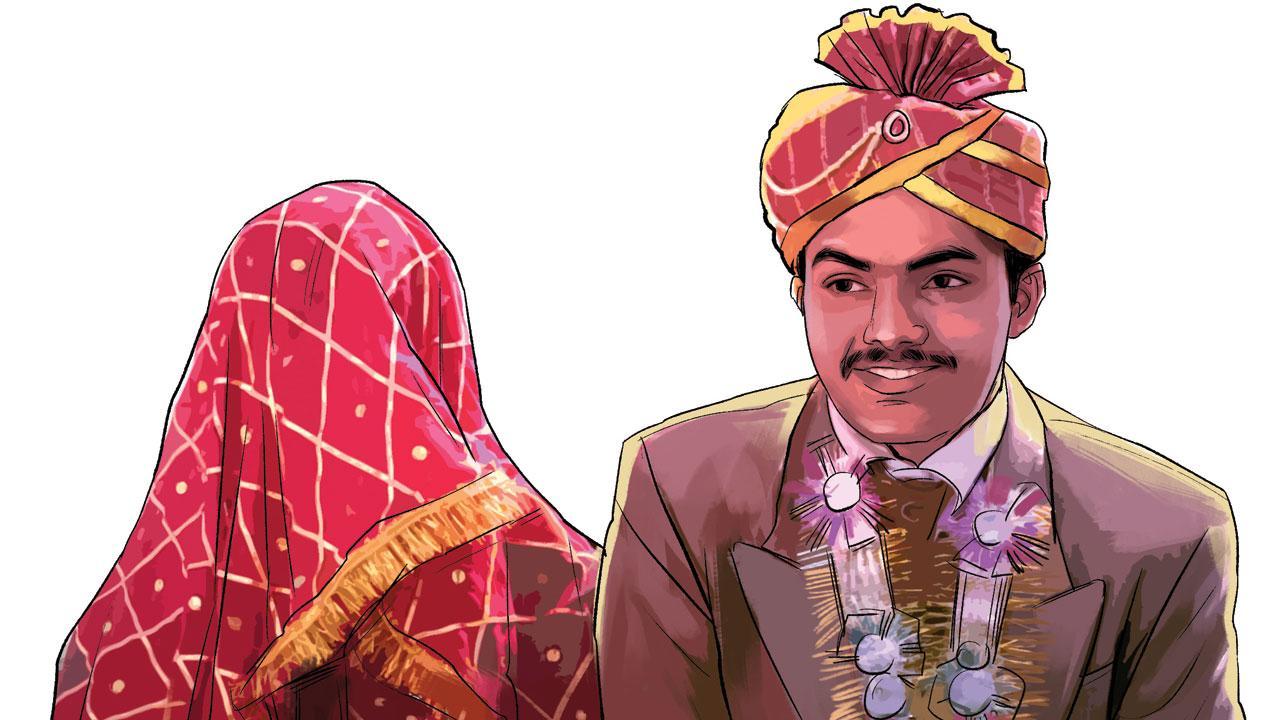It got standing ovations at two screenings at TIFF, leaving no one in doubt about the deep chord it touched in an international audience.

Illustration/Uday Mohite
Key Highlights
- The film releases on January 5, 2024
- Mark the date as this gorgeous film is a great way to start next year.
- In all this, Ravi Kishan is a hoot as the shady police officer charged with investigating
![]() One of the highlights of Indian and South Asian cinema at the Toronto International Film Festival (TIFF) this year was Kiran Rao’s Laapataa Ladies (Lost Ladies). About two newly-wed brides who accidentally get lost from the same train (they’re both wearing long, red wedding ghunghats and can’t see a damn thing), it is an entirely delicious comedy/satire that packs in a powerful social and feminist commentary about the identity and status of Indian women in a deeply patriarchal society, both in and beyond marriage. It got standing ovations at two screenings at TIFF, leaving no one in doubt about the deep chord it touched in an international audience.
One of the highlights of Indian and South Asian cinema at the Toronto International Film Festival (TIFF) this year was Kiran Rao’s Laapataa Ladies (Lost Ladies). About two newly-wed brides who accidentally get lost from the same train (they’re both wearing long, red wedding ghunghats and can’t see a damn thing), it is an entirely delicious comedy/satire that packs in a powerful social and feminist commentary about the identity and status of Indian women in a deeply patriarchal society, both in and beyond marriage. It got standing ovations at two screenings at TIFF, leaving no one in doubt about the deep chord it touched in an international audience.
This is Rao’s second feature after her debut Dhobi Ghat (Mumbai Diaries) that was also at TIFF in 2010, 13 years later. Meanwhile, she has also produced about 17 films, a formidable body of work, which includes Taare Zameen Par, Peepli [Live] (that was at Berlin Film Festival), Dangal (a landmark film that also made more money in China than in India), Secret Superstar, Laal Singh Chaddha and Laapataa Ladies—apart from co-parenting a son, Azad, with Aamir Khan. Laapataa Ladies, which had a world premiere in TIFF’s Centrepiece section, is produced by Aamir Khan Productions, Rao’s Kindling Pictures and Jio Studios.
Set in 2001 in a fictional town in rural central India, it is a powerful signal from Rao, who has been operating from the heart of Bollywood, yet the film is entirely set in rural India, and has credibility and a warm understanding of that world. Khan and Rao are also founders of the Paani Foundation that has been doing sterling work in water management in rural India for years, and the experience seems to have given Rao deeper insights that inform her narrative.
Rao directs with a sure hand, a deep understanding of the frustrating contradictions of being a woman in India, and with tremendous empathy. Two brides, Jaya (Pratibha Ranta) and Phool (Nitanshi Goel), accidentally get mixed up: it’s an auspicious day and two-three newly-wed couples are taking the train home to their villages: as his station arrives at midnight, Phool’s timid husband Deepak (Sparsh Shrivastava) mistakenly escorts Jaya out of their train and discovers her identity only when they get home and her ghunghat is drawn back. Phool, meanwhile, finds herself abandoned at a remote railway station, and is befriended by a dwarf urchin and Manju Mai (Chhaya Kadam), who runs a tea stall. Jaya, meanwhile, is confident but acts suspiciously, changing her phone SIM card, making secret calls while claiming to go to the temple and more, and dazzles her temporary “in-laws” by teaching them about organic farming and pesticides. In all this, Ravi Kishan is a hoot as the shady police officer charged with investigating the double missing bride case.
Marvellously adapted from a Biplab Goswami short story by Sneha Desai, with wonderful dialogues by Divyanidhi Sharma, you often find yourself laughing, with a lump in your throat. When Phool insists her mother has brought her up well, as she can cook, sew and sing bhajans, Manju Mai snorts, “Yes, but can you go home?” and is only met with silence, a stinging commentary on how families truss up women’s lives in household duties, and are protective about girls, leaving them with no smarts whatsoever to navigate this zaalim world. The climax has a few aces up its sleeve and packs a wallop about women finding their own identity within and beyond marriage, and is wonderfully uplifting. The ensemble cast of non-actors and relatively new actors is superb, including Pratibha Ranta, Nitanshi Goel and Sparsh Shrivastava, along with veterans Ravi Kishan and Chhaya Kadam. Vikash Nowlakha’s cinematography is low key and effective, and Jabeen Merchant’s editing keeps the narrative tight, and us guessing till the end. Ram Sampath’s music is the beating heart of this film, deliciously local, but also with mischievous lyrics and the exquisite “Dheeme dheeme chali purvaiya” song over the end credits. The sound design is effective too. The women crew include director Kiran Rao, producers Kiran Rao and Jyoti Deshpande, screenwriter Sneha Desai and editor Jabeen Merchant—brava, ladies! Kiran: sorry, cannot wait for another vanvaas, please hurry up with your next, dil maange more. The film releases on January 5, 2024. Mark the date as this gorgeous film is a great way to start next year.
Meenakshi Shedde is India and South Asia Delegate to the Berlin International Film Festival, National Award-winning critic, curator to festivals worldwide and journalist.
Reach her at meenakshi.shedde@mid-day.com
 Subscribe today by clicking the link and stay updated with the latest news!" Click here!
Subscribe today by clicking the link and stay updated with the latest news!" Click here!










